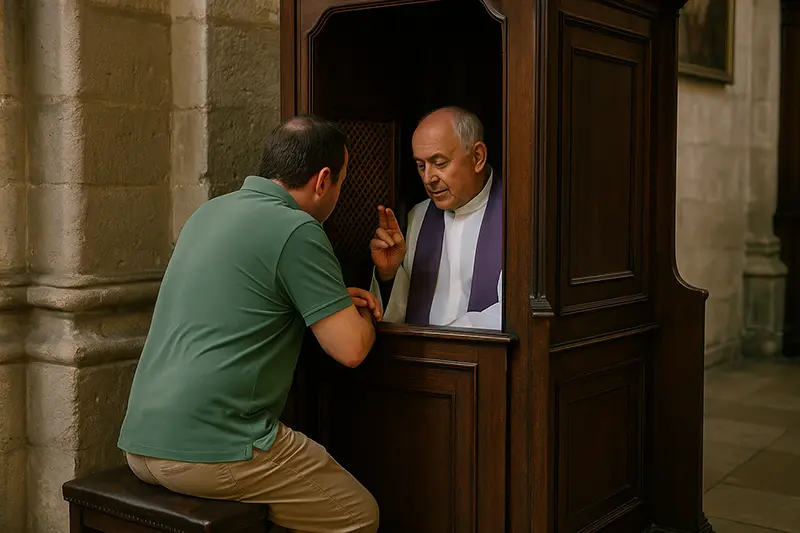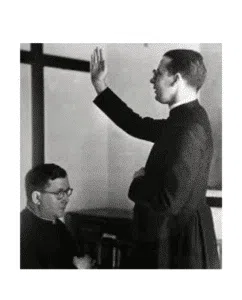
"Jesus Christ our Lord, our God, instituted the sacraments, which are like the footprints of his footsteps, so that we may tread there and reach Heaven. And one of the most beautiful and consoling sacraments is the sacrament of Confession", St. Josemaría Escrivá, Argentina, June 15, 1974.
St. Josemaría quoted and here we show you what he said about the sacrament as a marvel of God's love.
Christ instituted this sacrament offering us a new possibility to convert and to recover, after Baptism, the grace of God.
"The sacrament of Reconciliation is a sacrament of healing. When I go to confession it is to heal myself, to heal my soul, to heal my heart and something I did and it doesn't work well", Pope Francis, General Audience, February 19, 2014.
Like all the sacraments, this is an encounter with Jesus. During Confession, we tell our sins to Jesus. priest who acts in the person of Christ and with the authority of Jesus to listen, offer guidance, provide adequate penance and pronounce the words of absolution.
"At the celebration of the In the Sacrament of Reconciliation, the priest does not represent God alone, but to the whole Community, which recognizes itself in the fragility of each of its members, which listens to their repentance, which is moved, which is reconciled with Him, which encourages and accompanies them on the path of conversion and of human and Christian maturity.
Someone may say: "I confess only to God". Yes, you can say to God: "forgive me", and tell him your sins. But our sins are also against our brothers, against the Church, and for this reason it is necessary to ask forgiveness from the Church and our brothers, in the person of the priestPope Francis, Catechesis of Wednesday, February 19, 2013.
St. Josemaría used to call Confession the sacrament of joy, because through it one recovers the joy and peace that friendship with God brings.

This sacrament not only restores our relationship as sons and daughters of God, but also reconciles us to each other by remaking our union with the Body of Christ, his Church.
Pope Francis explained the importance of confession with these words: "The forgiveness of our sins is not something we can give ourselves. I cannot say: I forgive myself my sins. Forgiveness is asked for, it is asked of another, and in Confession we ask Jesus for forgiveness. Forgiveness is not the fruit of our efforts, but it is a gift, a gift of the Holy Spirit".
There are several details that we can take into account to do it in a deeper and more effective way.
For example, we can help ourselves with a guide with the necessary keys for a good examination of conscience. It is the moment to be sincere with oneself and with God, knowing that He does not want our past sins to oppress us, but that He wants to free us from them so that we can live as His good children.

The Catechism of the Church proposes four steps for a good confession. These express the path to conversion, which goes from the analysis of our actions to the action that demonstrates the change that has taken place in us.
There are four steps we take to be able to receive the great embrace of love that God, our Father, wants to give us with this sacrament: "God waits for us, like the father in the parable, with outstretched arms, even if we do not deserve it. Our debt does not matter. As in the case of the prodigal son, we need only open our hearts" (St. Josemaría, Christ Is Passing By, no. 64).
In the examination of conscience we try to examine our soul in prayer before God, in the light of the teachings of the Church, starting from our last confession.
We reflect on those actions, thoughts or words that may have distanced us from God, offended others or harmed us internally.
There are several details that we can take into account to do it in a deeper and more effective way. For example, we can use a guide with the necessary keys for a good examination of conscience.
It is the moment to be sincere with oneself and with God, knowing that He does not want our past sins to oppress us, but that He wants to free us from them so that we can live as His good children.
Contrition or repentance, is a gift from God. It is a sorrow of the soul and a rejection of our sins, which includes the resolution not to sin again.
Confession consists of telling sins to the priest. Sometimes, repentance comes with an intense feeling of pain or shame, which helps us to make amends. But this feeling is not indispensable. The important thing is to understand that we have done wrong and to have the desire to improve as Christians. Otherwise, we will put ourselves in God's hands to ask Him to work in our hearts to reject evil.
"Contrition," the Pope explains, "is the portico of repentance, it is that privileged path that leads to the heart of God, who welcomes us and offers us another chance, provided that we open ourselves to the truth of penance and allow ourselves to be transformed by his mercy.
The priest is an instrument of God. Let us put aside shame or pride, and open our souls in the certainty that it is God who listens to us.
"Confessing to a priest is a way of placing my life in the hands and heart of another, who at that moment acts in the name and on behalf of Jesus. [It is important that I go to the confessional, that I place myself in front of a priest who represents Jesus, that I kneel in front of Mother Church, who is called to distribute the Mercy of God. There is an objectivity in this gesture, in kneeling in front of the priest, which, at that moment, is the process of the grace that comes to me and heals me."Pope Francis. The name of God is mercy, 2016.
Confession consists of telling sins to the priest. It is often said that a good confession has "4 C's":
Confession is a sacrament, the celebration of which includes certain gestures and words on the part of the penitent and the priest. the most beautiful moment of the sacrament of Confession, for we receive God's forgiveness.
Penance is a simple act that represents our reparation for the fault we have committed. It is also a good occasion to thank God for the forgiveness we have received, and to renew our resolution not to sin again.